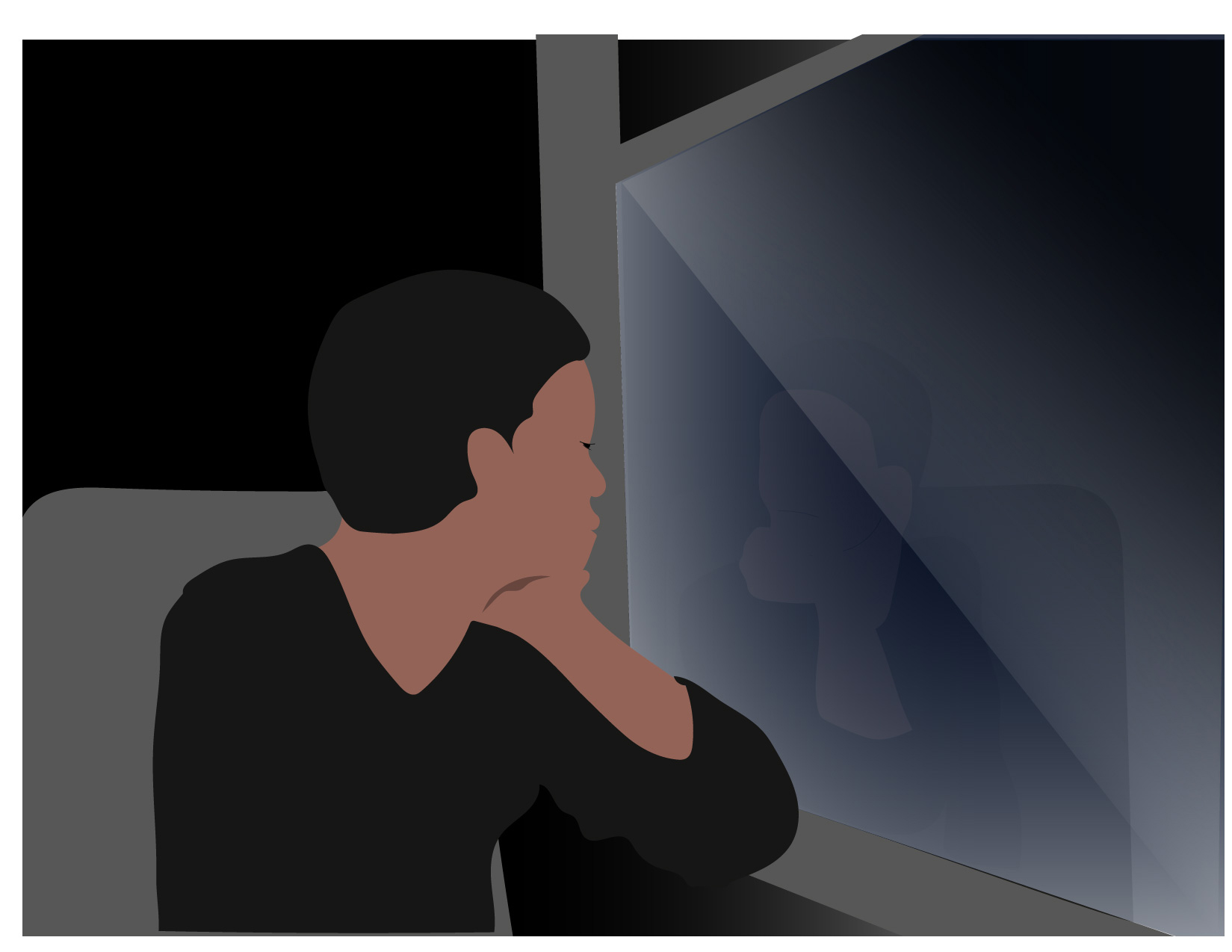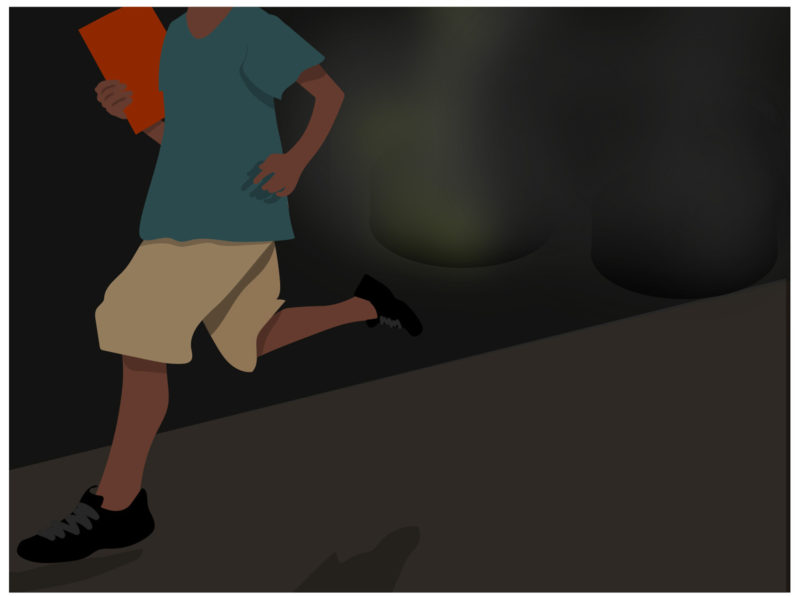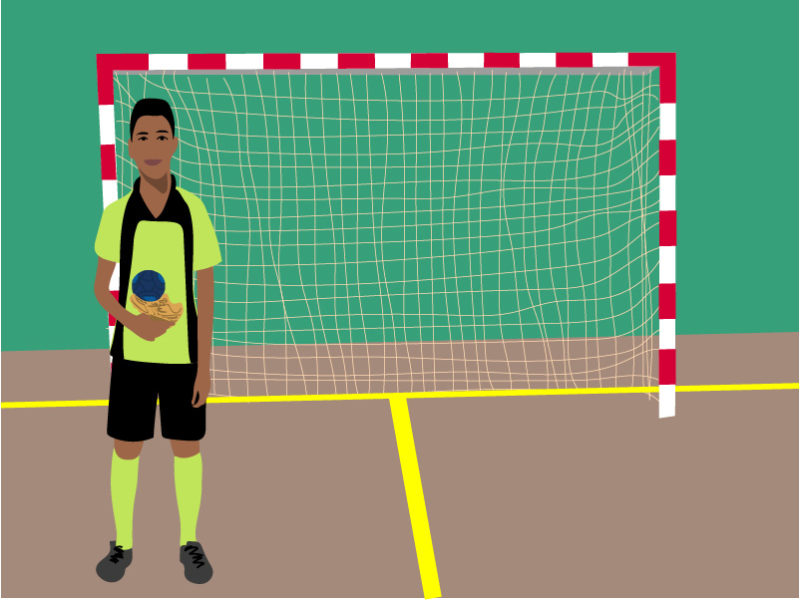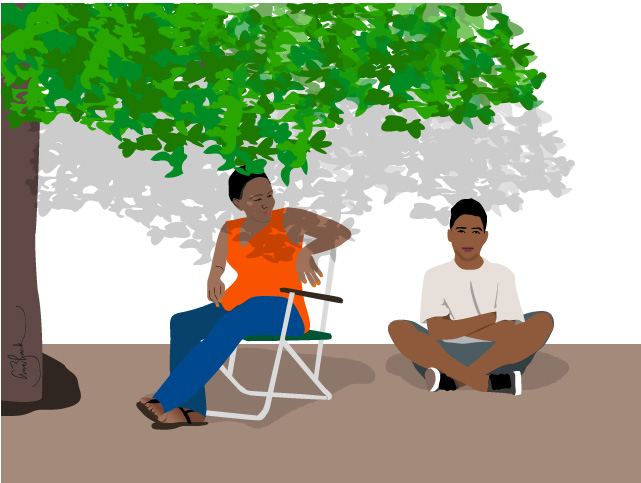

Karina had gone to Barranquilla to look for a sustenance that she did not get in Maracaibo, in the northwest of Venezuela. On July 20, 2017, she received a call from home. Jean Luis, her second son, only 15 years old, had been shot dead during protests staged in her neighborhood. This story, written by the narrator and journalist Milagros Socorro, is the first in a series about the six youngest Venezuelans who lost their lives in the opposition demonstrations in 2017.


She is a mess. Only waking up, and the world is crushing on her. She knows how it is. She will spend the day thinking that it is a nightmare, that one day she will wake up and Jean Luis will be there. But now it is precisely the moment when everything starts again and she is uncapable of staying in bed for a century, hearing the noises of the house and feeling how the tears cool down in their slow trip through her temples. Already the girl has begun to moan. If nobody comes to her side, she will appeal to a vigorous bellowing that Karina prefers to avoid. It is one of the great marks of mourning: the mourner wants silence. If it were for her, she would live under the water, where no voices or noise can be heard and where the tears are invisible, like the air.
You have to start with something. Before even taking her daughter out of the crib, Karina reserves a few minutes to collect her hair and order it under an elastic helmet, made with the remains of a pantyhose. It’s at least something. It gives her the feeling that she can still control something, put something in its place, save herself a calamity.
On her way to the cradle, she drags her feet. She still has that bad habit. It’s like she does not have the strength to lift them. Is not during that time, which is when the horrible instants come upon her like gusts that prove that it was not a nightmare. Or, in any case, one she will not wake up from it.
Karina de Lugo is 36 years old and has four children. Now, three. She was in Barranquilla, Colombia, where she had gone to work as a domestic worker, when she received the call. Her mother tried to break the news in installments, but death works without mercy, even in spreading its ravages. There was no way.
“Mija, there was an accident,” said the lady on the phone. I told Jean not to go where his friend was…
“But, what’s wrong? What happened?”
“They screwed my boy”.
“How come they screwed him? Was he beaten? What happened?
Karina left the phone in the hands of her sister, her aunts, who screamed and passed it to her as if the device was a viper’s small cage. One of them told Karina that her son Jean Luis had been shot, to which she shouted to take him to a hospital.
“No, Kari,” her sister spoke to her softly. “The boy is dead.”
That same night she made his way to Maracaibo, her city, capital of Zulia state. She was accompanied by her sister, who also emigrated to be employed in “family homes”, and her two daughters, whom she took with her when she decided to go to Colombia.
It was the longest trip of her life. The most exasperating, the most painful. When she finally arrived home, with her mouth dry, her feet swollen and her eyes as if they had been sprinkled with lemon, she paused for a moment at the door. She wanted to absorb the presence of her son, something of him that still remained alive among those walls. A certain tremor, a small echo of his laughter … In the background she spotted Enderson, her eldest son.
It took her time to find the shape of that ghostly figure. His face was covered with a towel. Karina wanted to hug him, comfort him, but he told her: “I can’t look you to the face, mother, I should have told him to stay home… I should have insisted.”
Karina de Lugo is her maiden name. They have never given her another. She was 19 when Enderson was born, who is now 17 years old. She had left school long ago, interrupted by the end of the ninth grade. Then Jean Luis was born, who was 15 years old when he fell dead on the street, on July 20, 2017, without still knowing if the bullet that killed him came from the weapon of a national guard or a robber who was swarming days around the guarimbas, those barricades lifted as a way of protest.
After separating from Enderson and Jean Luis’ father, Karina had a new couple, “who did not work either,” and had Alexandra, 12 years old, and Camila, one year old. The relation ended soon after her birth. When referring to the respective fathers of her children, Karina says that sometimes, at Christmas, on birthday, or maybe on child day, they help with expenses. “Sometimes …” and “help”, as if it was a graceful concession and not an obligation, as it is for her. Karina’s life is like that, like the life of someone that only deserves to receive just a little, barely, very, very little.

She lives in her mother’s house, located in a neighborhood of the Pomona sector, Manuel Dagnino parish, Maracaibo municipality, in this western city on the shores of the lake. In addition to a room and a dining room, the house has two rooms, where the usual residents plus the family that make up Karina and their children must be arranged. At some point, she wanted to build an adjacent room, but only could progress very little and never was able to finished it.
The horrible images come to her mind. Enderson told her that when they came to tell him that Jean Luis had been shot, he ran to the Pomona bridge, where his brother had fallen. The road became eternal and he move forward without respite. When he arrived, he still was alive. They had picked him up and they were carrying him. Someone told him to put his finger in his mouth so he would not drown in his own blood, but he couldn’t. There were those who shouted that they had to take him to a hospital, but there was no car around. That day was the National Trancazo, a protest to close the streets called by the opposition against Nicolás Maduro regime. The events occurred precisely in the protest checkpoint. Minutes kept running. They chose to take him on walking to the CDI del Pinar, which is a half-hour walk away. “But when they arrived,” says Karina, “there were no supplies to help him. And I was not in town”
Karina was not there, but Enderson has told her many times that when he managed to get close to her brother, already at the CDI (Integral Diagnostic Center), Jean Luis did not manage to tell him anything, but he did look him in the eyes with great intensity. He was dying, but still hung to his t-shirt to bring him close to his mouth. “As if he wanted to kiss Enderson or tell him something, I do not know.”
They made everybody leave, including Enderson, who barely let go of Jean Luis’s sweaty hand. But soon a doctor came out and shook her head. Jean Luis was gone. “I didn’t make it,” Karina says and swallows thickly. “The death certificate says that the bullet entered and went through. What I know is that there was no ambulance available, no supplies to save him and nobody to held responsible.”

Jean Luis Camarillo de Lugo was born in Maracaibo on May 17, 2002.
He was studying ninth grade and was part of the indoor football team in Las Piramides sector. Not for brief, his biography is less explicit of the country where he was born, grow and die, precisely during the opposition protests of mid-2017, when an avenue called Circunvalación number 1 became one of the most dangerous roads in Maracaibo. Along the avenue, hooded groups, infiltrated in protest activities, wove checkpoints demanding tolls and assault those who went by driving cars or motorcycle. Days before the murder of Jean Luis, the local press reported the dangerousness of the sector and the numerous crimes committed there.
For that reason, and by a flagrant lack of investigation, the death of the high school student was attributed to diverse circumstances that indicated even that him was a robber who wanted to assault an armed motorized man … This conjecture is not plausible. More credible is the one that offered by the family, with support from neighbors and a few witnesses. Jean Luis, who had passed the first and second years of high school, without failing any school subjects, had failed some in the third year. A thousand difficulties had brought him to school failure: almost every day he went to school without breakfast; He had started the school year late because he did not have the uniform; on many occasions he could not fulfill the assignments because the family did not have the money for the materials; the air conditioning and the fan in Karina’s children bedroom had been damaged, so they spent the nights roasting in the heat of the boiling Maracaibo weather; also, of course, the constant blackouts in this oil rich city did not help much to the normal performance of student activities. This scenario is the one that had forced Karina to move to Barranquilla leaving her teenagers, coming back every two weeks to bring them food.
“I had to let it go,” is how she justifies it. Referring to leaving, and making the decision to go to another country. She left when her son’s pants were getting too short for them. Especially Jean Luis, who was the youngest but also the tallest. By that time, they had to go to school without breakfast, but the fact that despite such deprivation those bodies insisted on growing what moved Karina to go and clean the bathrooms and kitchen of the house of another woman.
That’s was why she was not there when the misfortune crossed the night to embed itself in the low part of the back and go through her son’s abdomen. Jean Luis went for some note to the house of a classmate; and heading back home he was caught in the middle of the dispute between armed motorcyclists and assailants / protesters. (The assailants / protesters category has been coined by the Venezuelan press, given the ambiguity of certain participants). These are not, by no means, the only versions of the facts. There are other variants, all of which involve: demonstrators – robbery – weapons in the hands of civilians – remarkable enthusiasm to shoot without looking at who could have passed through the projectile route.

-Two months ago my son was kill- Karina sighs one day at the end of September 2017 -. I think and think … Two years ago, there were also demonstrations. I worked at La Limpia and I saw so many things, imprisoned boys, horrible mistreatment by the National Guard and the police, injustices of all sizes, and there are no consequences. Now, likewise, nothing is going to happen … The same president continues in office. Food shortage continues and people keep dying. Indolence in the country is the same, and I see that the President has the strength to sit down and talk … I look at him on the TV screen. I would like to be there and say to him: How can you say that nothing is happening? There may be a thousand dead and you keep saying we’re fine. Who you’re going to full? If Venezuelans are the ones who are experiencing hunger and scarcity.
“You know what I would want” -she says, “if God granted me a minute face to face with Maduro to ask him. Perhaps he will not answer, maybe they’ll kill me, I don’t know. But a minute will no be enough. I’ll begin asking him: What’s going on in your head? My mom was a Chavista. And when he was, Chávez was alive, she said: ‘I am a Chavista. Hugo Chávez steals, but he also helps the people a lot.’ Because we have family members who he gave them housing and helped with pensions. I do not enjoy Mother of anything (she says referring to the name of the governmental program Misión Madres del Barrio), nor does my mother has a pension. In fact, I suffer from myopia and astigmatism, and I had surgery years ago at the Eye Clinic, and now I can’t even go to a medical consultation. If I do not work, I do not eat, because even though I am a single mother, I have not been lucky enough to receive help. Let’s say that Maduro is not to blame, because the economy had been swimming since the late Chavez was there. But, hell, give up the Presidency. Let another one to come and we will see if we sink further or recover. Please, people are dying of hunger and he is still there saying ‘we’re fine’.”
After that 12-hour trip with a handkerchief stuck to her face, when she crossed the border between two countries and between having a teenage son who dreams of being a soccer player and being the mother of a dead boy, Karina has not returned to Barranquilla. She does not work in other people’s houses anymore. Now she makes trips to Maicao, a Colombian town relatively close to Maracaibo, carrying meat to sell. It is what is called contraband extraction. The controlled prices of food in Venezuela makes it easy to sell in the neighboring country.
As for Enderson, he has not gone to soccer practice anymore. “He says he has no strength. He says he prefers to work to help me move forward. He says he does not want to study. He says he better help me with those heavy bags that I take to Maicao.
He says he should have forbidden his brother to go out that day. He says that he told him once not to go, but he did not insist. He says he should have stood strong like the big brother he is. And I tell him that if I had been here, the same thing would have happened, because sometimes you do not see the danger. ”
Investigation of Estefanía Reyes.
Translation: Josefina Blanco


This story is part of the series They were only children, developed in partnership with the Community Learning Center (Cecodap) and the support of El Pitazo.
1390 readings
Milagros Socorro is a Venezuelan journalist and fiction writer.